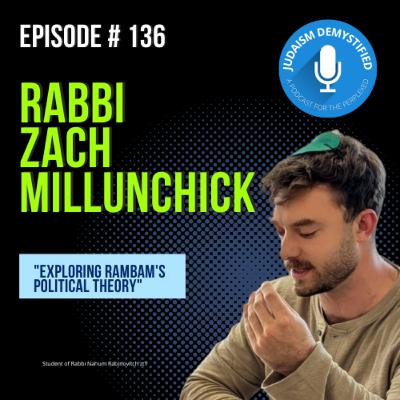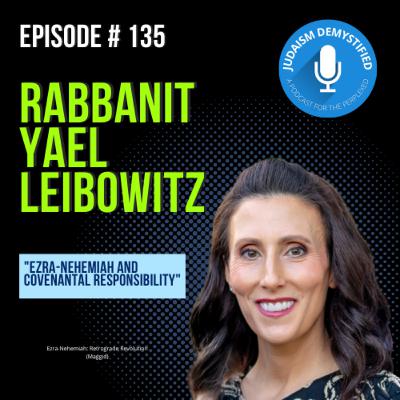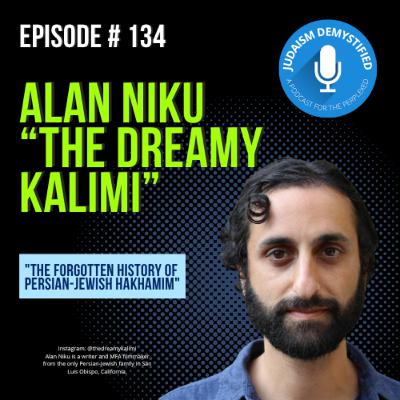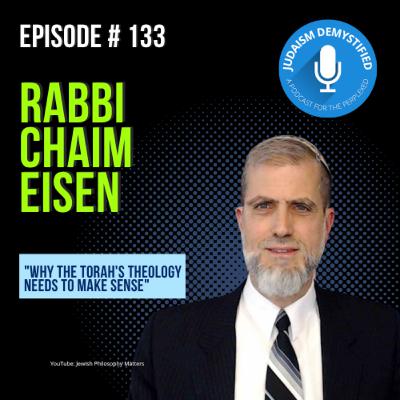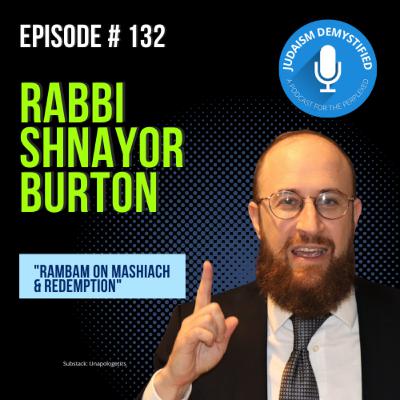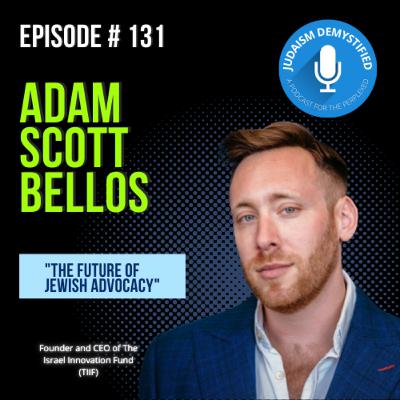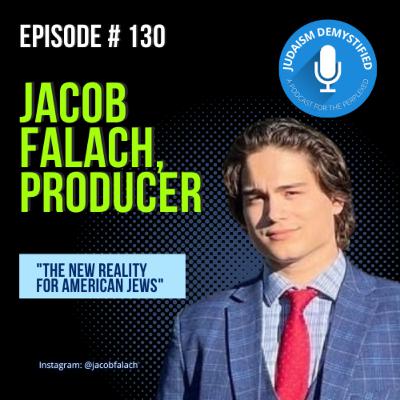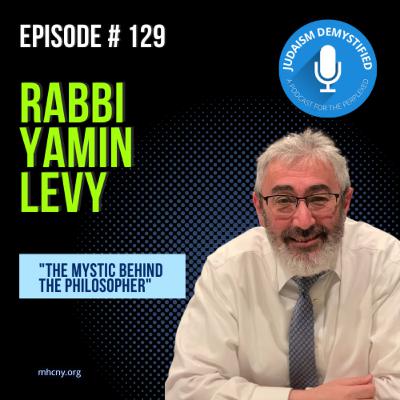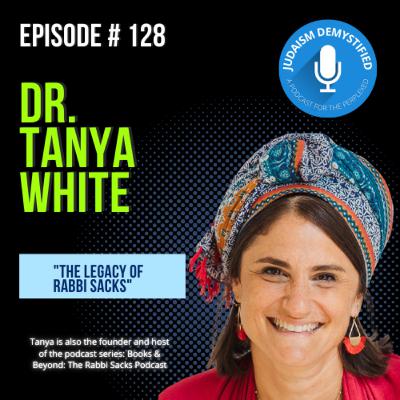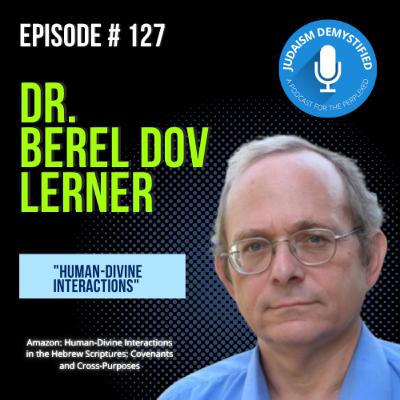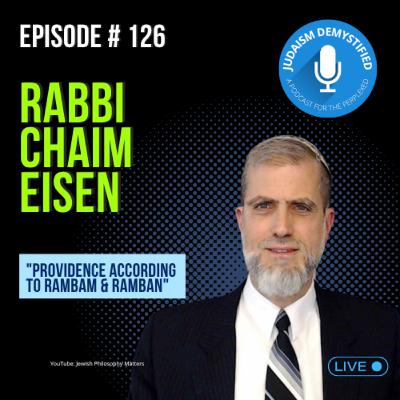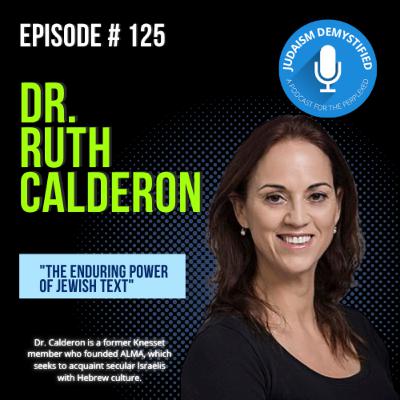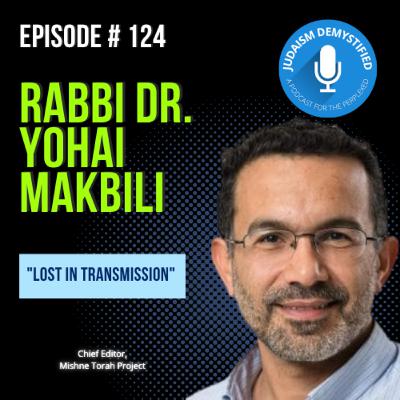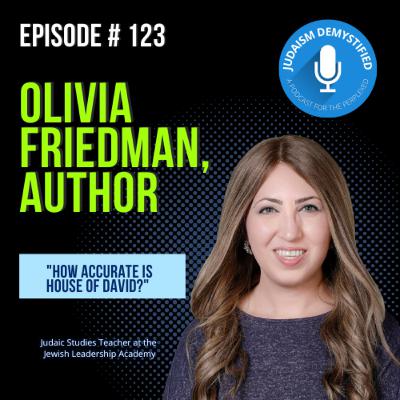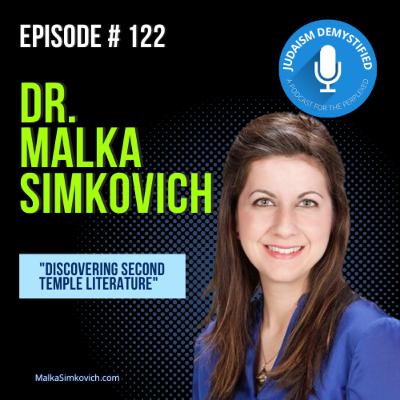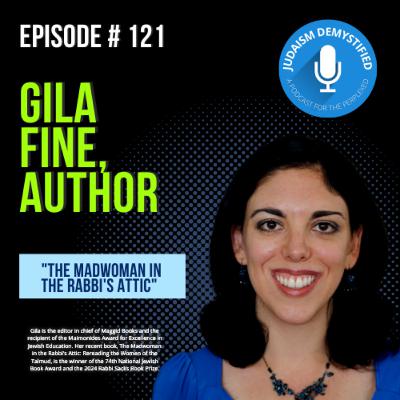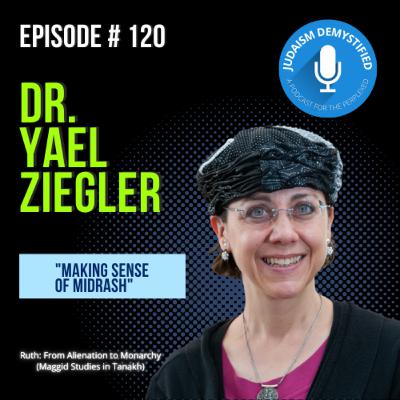Discover JUDAISM DEMYSTIFIED | A Guide for Today's Perplexed: Torah Foundations, Reason, and Tradition
JUDAISM DEMYSTIFIED | A Guide for Today's Perplexed: Torah Foundations, Reason, and Tradition

JUDAISM DEMYSTIFIED | A Guide for Today's Perplexed: Torah Foundations, Reason, and Tradition
Author: Ben Koren and Benzi Siouni | A Geonic-Maimonidean Approach to Torah Through the Ages and Today
Subscribed: 69Played: 3,420Subscribe
Share
© Ben Koren and Benzi Siouni | A Geonic-Maimonidean Approach to Torah Through the Ages and Today
Description
Hosted by lifelong friends Ben Koren and Benzi Siouni, Judaism Demystified was founded to explore topics often overlooked in conventional Jewish education. Through long-form conversations with leading religious thinkers, scientists, and historians, the podcast draws from the Geonic-Maimonidean tradition while embracing the intellectual legacy of Rabbi Sacks. Our goal is to reignite a passion for classical Jewish wisdom, returning to foundational ideas and fostering meaningful engagement with Jewish thought.
140 Episodes
Reverse
In this episode, we sit down with Rabbi Dr. Yosie Levine to explore the life, world, and enduring significance of Hakham Tsevi Ashkenazi, the towering early modern rabbinic figure at the center of his book Hakham Tsevi Ashkenazi and the Battlegrounds of the Early Modern Rabbinate. We begin at the very beginning: what draws a historian to write a full-scale study of Hakham Tsevi, and why his career offers such a powerful window into early modern rabbinic life and the development of halakha. Moving beyond biography, Rabbi Dr. Levine explains how Teshuvot function not only as halakhic documents but as rich historical sources that illuminate communal pressures, lived religion, and the texture of Jewish decision-making in a rapidly changing world. The conversation then turns to the political and cultural dynamics shaping Jewish communities of the period, and how these forces complicated the relationship between rabbis and their congregations. We examine Hakham Tsevi’s nuanced engagement with Sefaradim and his defense of certain Sepharadi approaches to Jewish law and minhagim, challenging simplistic Ashkenazi–Sepharadi divides. Rabbi Dr. Levine also unpacks Hakham Tsevi’s attitude toward Kabbala and how it manifests within his Teshuvot, revealing a careful, principled posture rather than a reactionary one. Finally, we delve into the dramatic Ḥayon Affair, tracing its significance not only as a personal crisis for Hakham Tsevi but as a defining moment in the broader battlegrounds of the early modern rabbinate.___*This episode is dedicated to the refua shelema of Sarah Miriam bat Tamar, Binyamin ben Zilpa, and our dear friend Yaakov ben Haya Sarah Malakh, and l'ilui nishmat Zehara Yehudit bat Yaakov Ezra v'Ilana Shira___• Bio: A scholar of early modern Jewish history, Rabbi Yosie Levine became the seventh rabbi of The Jewish Center in 2008, after serving there for four years as Rabbinic Intern, Assistant Rabbi, and Associate Rabbi under the mentorship of Rabbi Dr. Norman Lamm, z”l; Rabbi Dr. Jacob J. Schacter; and Rabbi Dr. Ari Berman. Prior to joining The Jewish Center, he served as educational director of the Lauder Foundation’s Beit Midrash in Berlin. Rabbi Levine has played a leadership role on the issue of day school affordability, pioneering a communal model for sustaining excellent Jewish education, and he is co-chair of the Manhattan Eruv. He is active in numerous communal organizations, including AIPAC, NORPAC, and the UJA-Federation of New York, where he previously served as a board member, and his advocacy for Israel has helped make The Jewish Center a model for Israel activism within and beyond the Religious Zionist community. Rabbi Levine earned a BA in English and Comparative Literature from Columbia College, received rabbinic ordination from the Rabbi Isaac Elchanan Theological Seminary as a Wexner Graduate Fellow, and holds a PhD in Early Modern Jewish History from Yeshiva University’s Bernard Revel Graduate School, where he serves as an adjunct professor and sits on the Dean’s Council. His work has appeared in both scholarly and popular publications, and his book, Hakham Tsevi Ashkenazi and the Battlegrounds of the Early Modern Rabbinate (Littman Library, 2024), is the recipient of the Association for Jewish Studies’ Jordan Schnitzer First Book Award.___• Get his book here: https://www.amazon.com/Ashkenazi-Battlegrounds-Rabbinate-Littman-Civilization/dp/1835536417___• Welcome to JUDAISM DEMYSTIFIED: A PODCAST FOR THE PERPLEXED | Co-hosted by Benjy & Benzi | Thank you to...Super Patron: Jordan Karmily, Platinum Patron: Craig Gordon, Rod Ilian, Gold Patrons: Dovidchai Abramchayev, Lazer Cohen, Travis Krueger, Vasili Volkoff, Vasya, Silver Patrons: Ellen Fleischer, Daniel M., Rabbi Pinny Rosenthal, Fred & Antonio, Jeffrey Wasserman, Jacob Winston, and Ariel Klainerman! Please SUBSCRIBE to this YouTube Channel and hit the BELL to can get alerted whenever new clips get posted, thank you for your support!
In this episode, we sit down with Rabbi Zach Millunchick to discuss tradition, authority, and the Rambam’s vision for halakhic and intellectual life today. Rabbi Millunchick reflects on being a student of Rabbi Nahum Rabinovitch a’h, who was also a formative teacher of Rabbi Jonathan Sacks a’h, and explains how Rav Rabinovitch’s approach continues to shape his worldview. From there, the conversation turns to his book Kakhol HaYam, which emerges from a deep commitment to the Rambam alongside a willingness to rethink assumptions about tradition, authority, and leadership. We explore his central claim that laws derived through the thirteen hermeneutical principles are fundamentally rabbinic, even when they appear indistinguishable from biblical law in the Talmud, and what this means for understanding halakhic authority. Rabbi Millunchick also explains the Rambam’s sharp distinction between clarifying the Torah’s meaning and creating new law through human reasoning, and why collapsing that distinction carries serious intellectual and religious consequences. The discussion then moves to the second half of Kakhol HaYam, where Rabbi Millunchick argues that the Rambam’s theory of halakhic authority cannot be separated from his political philosophy, including his views on courts, governance, and human perfection. We consider whether this model of tradition—neither rigid nor relativistic—is viable in the absence of a Sanhedrin, or whether it reveals unresolved tensions in modern Jewish life. The episode concludes with a conversation about Jewish education in Israel, particularly within the Dati Leumi world. Rabbi Millunchick addresses the common blending of Rav Kook and the Rambam, explains what he believes needs to change in the yeshiva curriculum, and shares his vision for a new mekhina he is developing with Rabbi Yohai Makbili and what he hopes students will take with them. Special thanks to Rabbi Jonathan Livi for connecting us and making this conversation possible.---*This episode is dedicated to the refua shelema of Sarah Miriam bat Tamar, Binyamin ben Zilpa, and our dear friend Yaakov ben Haya Sarah Malakh, and b'ilui nishmat Zehara Yehudit bat Yaakov Ezra v'Ilana Shira.---• Bio: Rabbi Zach Millunchick is a student of Rabbi Nahum Rabinovitch, of blessed memory, and is currently working on the continuation of his monumental commentary on the Mishne Torah, the Yad Peshuta. He authored the book כחול הים - על העברת המסורת והנהגת העם במשנת הרמב״ם, which focuses on the Rambam’s political theory, from both halakhic and philosophical perspectives.---• Welcome to JUDAISM DEMYSTIFIED: A PODCAST FOR THE PERPLEXED | Co-hosted by Benjy & Benzi | Thank you to...Super Patron: Jordan Karmily, Platinum Patron: Craig Gordon, Rod Ilian, Gold Patrons: Dovidchai Abramchayev, Lazer Cohen, Travis Krueger, Vasili Volkoff, Vasya, Silver Patrons: Ellen Fleischer, Daniel M., Rabbi Pinny Rosenthal, Fred & Antonio, Jeffrey Wasserman, Jacob Winston, and Ariel Klainerman! Please SUBSCRIBE to this YouTube Channel and hit the BELL so you can get alerted whenever new clips get posted, thank you for your support!
In this episode, we sit down with Rabbanit Yael Leibowitz to explore the bold ideas at the heart of her work on Ezra–Nehemiah. She explains why she frames the book through the striking theme of a 'Retrograde Revolution,' and how this lens reveals a story of renewal that moves forward specifically by returning to the foundations of Jewish identity. Rabbanit Leibowitz then walks us through her distinctive approach to studying Ezra–Nehemiah—not primarily as political history, but as a deeply literary and theological text—and how this perspective reflects her broader understanding of what Tanakh is and how it relates to history. We also address a surprising reality: despite being part of the biblical canon, Ezra–Nehemiah remains one of the least-studied books among regular Torah learners. Rabbanit Leibowitz explains why these chapters are essential for today’s Jewish reader and what timeless lessons they offer for community, belonging, and spiritual restoration. Finally, we discuss her powerful chapter, “What Is a Jew,” which examines the complexities of Jewish identity as they emerge in the book of Ezra and how those ancient questions continue to resonate in the modern world.---*This episode is dedicated to the refua shelema of Sarah Miriam bat Tamar, Binyamin ben Zilpa, and our dear friend Yaakov ben Haya Sarah Malakh---• Bio: Yael Leibowitz is an Israeli educator. She holds a Master’s degree in Judaic Studies from Columbia University, taught at the Upper School of Ramaz, and is a former faculty member of Yeshiva University’s Stern College for Women where she taught advanced Bible courses. She currently teaches at Matan Women’s Institute for Torah Learning and Midreshet Lindenbaum College for Women.---• Get her book here: https://www.amazon.com/Ezra-Nehemiah-Retrograde-Revolution-Yael-Leibowitz/dp/1592647073---• Welcome to JUDAISM DEMYSTIFIED: A PODCAST FOR THE PERPLEXED | Co-hosted by Benjy & Benzi | Thank you to...Super Patron: Jordan Karmily, Platinum Patron: Craig Gordon, Rod Ilian, Gold Patrons: Dovidchai Abramchayev, Lazer Cohen, Travis Krueger, Vasili Volkoff, Vasya, Silver Patrons: Ellen Fleischer, Daniel M., Rabbi Pinny Rosenthal, Fred & Antonio, Jeffrey Wasserman, and Jacob Winston! Please SUBSCRIBE to this YouTube Channel and hit the BELL so you can get alerted whenever new clips get posted, thank you for your support!
In this episode of Judaism Demystified, Alan Niku—better known as The Dreamy Kalimi—shares what first pulled him into preserving and spotlighting Persian Jewish history through his Instagram and YouTube work. He gives a clear snapshot of what makes Iranian Jewry so distinct within the broader Jewish world. Alan highlights a core theme in his research: Persian Jewish heritage was never one-dimensional. It included rationalists, mystics, poets, philosophers, halakhists, and community leaders whose voices shaped their communities but were later forgotten or overlooked. He explains why that diversity faded from memory and what is lost when those voices disappear. The conversation then turns to two figures who capture this intellectual range—Rabbi Yehuda ben Elazar (the Riba) and Mollah Siman-Tov Melamed. Alan discusses why these hakhamim resonate with him and what their teachings reveal about the depth of Persian-Jewish thought. Before we wrap up, he gives us a look at the projects he’s working on to revive, translate, and reintroduce these texts and ideas to a new generation. You don't want to miss this riveting discussion.---*This episode is dedicated to the refua shelema of Sarah Miriam bat Tamar, Binyamin ben Zilpa, and our dear friend Yaakov ben Haya Sarah Malakh---• Bio: Alan Niku is a filmmaker, writer, and scholar of Mizrahi culture from San Luis Obispo, California, based in Los Angeles. A native speaker of Persian, he spends his time learning related Jewish languages, deciphering Judeo-Persian manuscripts, and interviewing community members about their stories. He is also a musician and an amateur chef, teaches history and Jewish heritage at various levels, and seeks to educate the world about the underrepresented cultures of the Middle East through his writing and films. He is widely known online as “The Dreamy Kalimi,” where he shares and celebrates the richness of Persian Jewish heritage on his highly entertaining and informative Instagram and YouTube channels.---• Check out his channel: https://www.youtube.com/ @Dreamy-Kalimi and his Instagram: https://www.instagram.com/the_dreamy_kalimi/---• Welcome to JUDAISM DEMYSTIFIED: A PODCAST FOR THE PERPLEXED | Co-hosted by Benjy & Benzi | Thank you to...Super Patron: Jordan Karmily, Platinum Patron: Craig Gordon, Rod Ilian, Gold Patrons: Dovidchai Abramchayev, Lazer Cohen, Travis Krueger, Vasili Volkoff, Vasya, Silver Patrons: Ellen Fleischer, Daniel M., Rabbi Pinny Rosenthal, Fred & Antonio, Jeffrey Wasserman, and Jacob Winston! Please SUBSCRIBE to this YouTube Channel and hit the BELL so you can get alerted whenever new clips get posted, thank you for your support!
One of our most frequently requested guests, Rabbi Chaim Eisen, returns for a wide-ranging conversation on the broader tradition of Ḥazal and the Rishonim, as illuminated through Maimonides’ cosmological framework. While Rambam describes the metaphysical structure of the universe—with its implications for providence, revelation, and miracles—in terms that reflect Aristotelian physics and cosmology, his goal was never to innovate a new philosophy, but to articulate the timeless truths of the Torah’s sages in the intellectual language of his era. Many assume that if the physics is outdated, the metaphysics must be too—but that assumption reflects a deep misunderstanding of how Maimonidean metaphysics stands independently of the physics and cosmology, and, moreover, how firmly that metaphysics stands within the mainstream rabbinic tradition. We explore how this unified worldview—shared by the overwhelming majority of the Rishonim—preserves the harmony between Torah, reason, and reality. The discussion also considers the potential role of Kabbalah as an alternative framework for our avodah (divine service), while recognizing the danger in reading its metaphors literally as a theological system. Finally, we consider some of the most profound theological questions about God’s omnipotence, transcendence, and the coherence of creation. Through this exploration, Rabbi Eisen shows how Maimonides and the other sages of Israel safeguarded authentic faith as both affirming the categorical transcendence of God, as Ḥazal explicitly enunciated it, and cohering with our conception of the reality of the world He created—in short, explaining how and why the Torah’s theology needs to make sense.---*This episode is dedicated to the refua shelema of Sarah Miriam bat Tamar, Binyamin ben Zilpa, and our dear friend Yaakov ben Haya Sarah Malakh---• Bio: Rabbi Chaim Eisen is the founder and dean of Yeshivath Sharashim – Zion Bible Studies, a Web-based educational venture to engage users worldwide in a deepening understanding of the Hebrew Bible and other religious classics, through live, recorded, and written content. An acclaimed speaker, he’s been stimulating audiences throughout Israel, North America, and Europe for over 40 years. For nearly all his career, he’s been involved in adult education, principally as a senior rabbinical lecturer at the Orthodox Union (OU) Jerusalem World Center, where he taught for more than 36 years. For over 20 years, he also taught Talmud and Midrash, Biblical commentary, and especially Jewish thought and philosophy at various yeshivot in Israel. In addition, he served as a Torah lecturer in the Israel Defense Forces Rabbinate Torah Lecture Corps (reserves), for over 16 years, and continued to volunteer there, after his retirement. Besides teaching, he was founding editor of the OU journal 'Jewish Thought: A Journal of Torah Scholarship' and has written and edited numerous essays in this field. He’s been teaching, editing, and publishing Judaica for more than four decades.---• Check out his channel: https://www.youtube.com/@jewishphilosophymatters ---• Welcome to JUDAISM DEMYSTIFIED: A PODCAST FOR THE PERPLEXED | Co-hosted by Benjy & Benzi | Thank you to...Super Patron: Jordan Karmily, Platinum Patron: Craig Gordon, Rod Ilian, Gold Patrons: Dovidchai Abramchayev, Lazer Cohen, Travis Krueger, Vasili Volkoff, Vasya, Silver Patrons: Ellen Fleischer, Daniel M., Rabbi Pinny Rosenthal, Fred & Antonio, Jeffrey Wasserman, and Jacob Winston! Please SUBSCRIBE to this YouTube Channel and hit the BELL so you can get alerted whenever new clips get posted, thank you for your support!
In this episode we sit down with Rabbi Shnayor Burton to explore Rambam’s view of Mashiach and Redemption. On the surface, the final chapters of Mishneh Torah read like a simple account of the messianic age, but a closer look opens far deeper questions: what truly changes in redemption, how maaseh bereshit and maaseh merkava should be studied, whether kingship can be redeemed from its past failures, and what halakha ultimately trains us toward. Hovering in the background is a parable of Rabbi Akiva—one that never fully discloses its nimshal, yet holds the key to humility and daat Hashem. Drawing on this, Rabbi Burton leads us to a convincing and surprising conclusion about how Rambam understands Mashiach: not as a miracle-worker, but as the leader who creates the conditions for humanity to live wisely under God’s kingship.---*This episode is dedicated to the refua shelema of Sarah Miriam bat Tamar, Binyamin ben Zilpa, and our dear friend Yaakov ben Haya Sarah Malakh---• Bio: Rabbi Shnayor Burton is a Torah scholar, teacher, and author. He lectures regularly on Rambam, Chumash, and Jewish thought. He is Senior Editor at ArtScroll Mesorah Publications, where he works on major projects including Kisvei HaRambam. Rabbi Burton has authored several books, most recently Ha’Aretz Asher Areka, on the mitzvah of living in Eretz Yisrael. He also publishes essays and lectures on Substack and other platforms, including his ongoing work Exodus, Exile and Redemption: Decoding the Enigma of Judaism’s Shifting Forms.---• Check out the Rabbi's blog here: https://shnayor.substack.com/---• Welcome to JUDAISM DEMYSTIFIED: A PODCAST FOR THE PERPLEXED | Co-hosted by Benjy & Benzi | Thank you to...Super Patron: Jordan Karmily, Platinum Patron: Craig Gordon, Rod Ilian, Gold Patrons: Dovidchai Abramchayev, Lazer Cohen, Travis Krueger, Vasili Volkoff, Vasya, Silver Patrons: Ellen Fleischer, Daniel M., Rabbi Pinny Rosenthal, Fred & Antonio, Jeffrey Wasserman, and Jacob Winston! Please SUBSCRIBE to this YouTube Channel and hit the BELL so you can get alerted whenever new clips get posted, thank you for your support!
Why is Jewish leadership failing the very people it claims to serve? In this unfiltered conversation, Adam Scott Bellos—founder, builder, unapologetic strategist—sits down with Jewish Demystified to torch the polite myths and diagnose the rot: the widening gap between institutions and everyday Jews, the addiction to gala dinners, and the influencer economy that treats advocacy like a clout market. We go head-on at the money—how treating “influence” as a commodity leaves Jews permanently outgunned by state-backed players like Qatar—and we ask what a post-glitz model of Jewish power actually looks like. Bellos makes the case for Hebraization (language, culture, sovereignty), community self-defense that doesn’t hide behind PR, and leadership that builds, not brands. We talk practical playbooks for protecting our communities without retreating into fear, and why Israel—despite talent and tech—keeps losing the narrative war. Are legacy groups like the ADL helping, or are they just laundering failure? If you’re done with performance and hungry for execution, this is the must-listen.---*This episode is dedicated to the refua shelema of Sarah Miriam bat Tamar, Binyamin ben Zilpa, and our dear friend Yaakov ben Haya Sarah Malakh---• Bio: Adam Scott Bellos is a revolutionary voice in Jewish innovation, identity, and culture. As Founder and CEO of The Israel Innovation Fund (TIIF), Adam is reshaping how the world connects to Israel—through wine, language, self-defense, and a cultural revival rooted in Hebraization. A media-savvy strategist and visionary builder, Adam has created bold platforms like Wine on the Vine and Shomrei Ha’Am that bridge Jewish heritage and modern activism. His upcoming book, Never Again Is Not Enough: Why Hebraization Is the Only Way to Save the Diaspora, lays out a sweeping ideological and strategic blueprint for Jewish renewal. With a background in politics, diplomacy, media, and business, Adam fuses storytelling with nation-building. He has advised Israeli leaders, appeared on international news networks, and led campaigns that blend Zionist philosophy with grassroots action. Adam isn’t just building projects—he’s building a movement. His work champions sovereignty, strength, and the centrality of Hebrew in Jewish life, forging a new model for cultural continuity and global Jewish resilience.---• Check out Adam's projects here: www.adamscottbellos.com---• Welcome to JUDAISM DEMYSTIFIED: A PODCAST FOR THE PERPLEXED | Co-hosted by Benjy & Benzi | Thank you to...Super Patron: Jordan Karmily, Platinum Patron: Craig Gordon, Rod Ilian, Gold Patrons: Dovidchai Abramchayev, Lazer Cohen, Travis Krueger, Vasili Volkoff, Vasya, Silver Patrons: Ellen Fleischer, Daniel M., Rabbi Pinny Rosenthal, Fred & Antonio, Jeffrey Wasserman, and Jacob Winston! Please SUBSCRIBE to this YouTube Channel and hit the BELL so you can get alerted whenever new clips get posted, thank you for your support!
Jacob Falach, writer and producer at The Daily Wire, joins us for a timely and candid conversation about what it means to be a committed Jew and Zionist in today’s political and cultural climate. We start with his background—his connection to Torah, his role at The Daily Wire, and what it's like to operate as an observant Jew in a largely Christian and secular conservative media space. We revisit his 2023 article, “Four Pervasive Myths About Israel—and Why They’re Wrong,” and ask how his thinking has evolved in light of the post-October 7 shift, where criticism of Israel has grown louder not just on the left, but from parts of the populist right. Falach reflects on the ideological contradictions among young Americans who champion human rights while supporting repressive regimes, and weighs in on the growing horseshoe convergence of anti-Israel sentiment. We also explore whether the traditional Hasbara model has failed—and what kind of messaging can actually reach Gen Z. Falach shares what gives him hope amid rising antisemitism and explains how Jewish tradition offers enduring moral clarity in a culture increasingly defined by confusion. This episode gets real about the challenges—and responsibilities—of being a Jew in today’s world, and from media battles to moral clarity, from faith to public pressure, Jacob Falach offers insight that’s sharp, grounded, and unapologetically honest.---*This episode is dedicated to the refua shelema of Sarah Miriam bat Tamar, Binyamin ben Zilpa, and our dear friend Yaakov ben Haya Sarah Malakh---• Bio: Jacob Falach is an activist in Conservative and Jewish values. He is a writer and producer for the Daily Wire, as well as an independent online political commentator.---• Follow Jacob on Instagram: www.instagram.com/jacobfalach---• Welcome to JUDAISM DEMYSTIFIED: A PODCAST FOR THE PERPLEXED | Co-hosted by Benjy & Benzi | Thank you to...Super Patron: Jordan Karmily, Platinum Patron: Craig Gordon, Rod Ilian, Gold Patrons: Dovidchai Abramchayev, Lazer Cohen, Travis Krueger, Vasili Volkoff, Vasya, Silver Patrons: Ellen Fleischer, Daniel M., Rabbi Pinny Rosenthal, Fred & Antonio, Jeffrey Wasserman, and Jacob Winston! Please SUBSCRIBE to this YouTube Channel and hit the BELL so you can get alerted whenever new clips get posted, thank you for your support!
Rabbi Yamin Levy returns for his second appearance on Judaism Demystified to delve into his new book, Jewish Mysticism: Essays on Maimonides’ The Guide of the Perplexed. This wide-ranging conversation explores the Rambam’s bold and often misunderstood ideas about God, Torah, and human purpose. We discuss the tension between halakha and the pursuit of higher consciousness, asking how Maimonides balances personal spiritual striving with the collective demands of Jewish law. Rabbi Levy also examines Maimonides’ deeply personal reading of Sefer Iyov, showing how the Rambam’s own suffering shaped his understanding of human resilience and his striking statement that, without Torah and philosophy, “I should have succumbed to my afflictions.” Finally, we unpack the Rambam’s radical theology in the Shema — why he claims it is as absurd to say God is “one” as it is to say He is “many,” and how this idea of God’s “radical oneness” challenges the very limits of human language and thought. This episode offers a rare window into the Rambam’s inner world and invites listeners to rethink how we relate to God, law, and the search for meaning.---*This episode is dedicated to the refua shelema of Sarah Miriam bat Tamar, Binyamin ben Zilpa, and our dear friend Yaakov ben Haya Sarah Malakh---• Bio: Rabbi Yamin Levy is a practiced educator, rabbi, author, and academic administrator. Rabbi Levy has devoted his career to teaching and preserving Sephardic culture, law and philosophical worldview. He is the founder and director of the Maimonides Heritage Center based in Tiveria, Israel and New York. He authored five books the most recent of which is titled “Jewish Mysticism: Essays on Maimonides' The Guide of the Perplexed.” He edited two books and published numerous articles in Jewish Law, Biblical Exegesis and Sephardic Philosophy and Jewish Mysticism.---• Check out Rabbi Levy's blog here: https://maimonidesheritagecenter.substack.com/---• Get Rabbi Levy's book here: https://a.co/d/c3g32Rq---• Welcome to JUDAISM DEMYSTIFIED: A PODCAST FOR THE PERPLEXED | Co-hosted by Benjy & Benzi | Thank you to...Super Patron: Jordan Karmily, Platinum Patron: Craig Gordon, Rod Ilian, Gold Patrons: Dovidchai Abramchayev, Lazer Cohen, Travis Krueger, Vasili Volkoff, Vasya, Silver Patrons: Ellen Fleischer, Daniel M., Rabbi Pinny Rosenthal, Fred & Antonio, Jeffrey Wasserman, and Jacob Winston! Please SUBSCRIBE to this YouTube Channel and hit the BELL so you can get alerted whenever new clips get posted, thank you for your support!
In this thoughtful and wide-ranging conversation, we sit down with Tanya White—educator, lecturer, and creator of the Books & Beyond podcast series—to discuss the enduring legacy of Rabbi Lord Jonathan Sacks and how his ideas continue to shape Jewish thought today. Tanya shares the inspiration behind the podcast and the personal and intellectual journey that led her to focus on four of Rabbi Sacks’s most influential books: To Heal a Fractured World, Future Tense, The Dignity of Difference, and Not in God’s Name. She offers insight into her process selecting guests—leading thinkers, scholars, and educators who engage deeply with Rabbi Sacks’s vision—and how these conversations helped her grow as both a scholar and a person of faith. As someone profoundly influenced by Rabbi Sacks and a fellow of the Sacks Scholars program, Tanya reflects on what it means to carry forward his mission in a world where his voice is sorely missed. We explore Rabbi Sacks’s prophetic warnings about antisemitism, populism, and moral relativism—challenges that have only intensified since his passing—and ask what kind of moral clarity and leadership is needed today. Tanya shares what she believes Rabbi Sacks would be urging us to do now and what responsibilities we bear in his absence, not just as Jews but as members of a broader moral community. Finally, we delve into the power of dialogue across generations. Tanya discusses how Books & Beyond is designed to keep Rabbi Sacks’s voice alive in the hearts and minds of young listeners, inviting them not only to learn from the past but to shape the future. For anyone seeking wisdom, depth, and a call to moral courage, this episode is a rich and inspiring listen.---*This episode is dedicated to the refua shelema of Sarah Miriam bat Tamar, Binyamin ben Zilpa, and our dear friend Yaakov ben Haya Sarah Malakh---• Bio: Tanya White writes, teaches and lectures on Tanach and Jewish Philosophy in Israel and abroad. She is a senior lecturer at the Matan Women's Institute for Torah Studies and LSJS and a lecturer in Jewish Philosophy at Bar Ilan University. The combination of an endearing personality, academic excellence and a love of Torah narrative makes Tanya’s content unique, inspiring and intellectually stimulating for audiences of all genres and levels. Her lectures leave every attendee enthused and challenged to dig deeper and hear more. As the creative director, founder, and host of the groundbreaking podcast series Books & Beyond: The Rabbi Sacks Podcast, Tanya curates thoughtful dialogues that extend Rabbi Lord Jonathan Sacks’s teachings into the twenty-first century, focusing on his most pivotal works and their relevance today. Across the series, she brings together an impressive array of guests, including Dr. Erica Brown, Sivan Rahav Meir, Natan Sharansky, Rabbi Dr. Meir Soloveichik, Dr. Mijal Bitton, Dara Horn, Michal Cotler-Wunsh, Rabbi Dr. Raphael Zarum, Gila and Alan Sacks, Daniel Lubetzky, Yoav Heller, Rabbi Dr. Samuel Lebens, Jonathan Haidt, and Dan Sacker—each offering their unique voice to illuminate Rabbi Sacks’s moral, philosophical, and theological legacy.---• Tune in to her podcast here: https://rabbisacks.org/books-and-beyond-podcast/---• Welcome to JUDAISM DEMYSTIFIED: A PODCAST FOR THE PERPLEXED | Co-hosted by Benjy & Benzi | Thank you to...Super Patron: Jordan Karmily, Platinum Patron: Craig Gordon, Rod Ilian, Gold Patrons: Dovidchai Abramchayev, Lazer Cohen, Travis Krueger, Vasili Volkoff, Vasya, Silver Patrons: Ellen Fleischer, Daniel M., Rabbi Pinny Rosenthal, Fred & Antonio, Jeffrey Wasserman, and Jacob Winston! Please SUBSCRIBE to this YouTube Channel and hit the BELL so you can get alerted whenever new clips get posted, thank you for your support!
We sit down with Professor Berel Dov Lerner, finalist for the Rabbi Sacks Book Prize, to explore his phenomenal book Human–Divine Interactions in the Hebrew Scriptures: Covenants and Cross-Purposes. With a background in philosophy, Prof. Lerner examines how God’s project—creating a worthy world—intersects with humanity’s project of making life in this world more livable. How do divine and human interests become intertwined? How does God take human concerns into account? And how do we, in turn, project our own moral frameworks onto God, expecting to relate to Him on our terms? Our conversation ranges widely: from negative theology to the Ramḥal’s vision of humanity’s role in drawing divine abundance into the world through covenants and moral action. We ask whether God’s plan would be acceptable if it belonged to a human being, and we explore how the Flood and Sodom narratives reveal God “tying His hands” with moral imperatives. Why does God honor His covenant with Avraham even when Sodom fails to uphold the Noahide baseline? And how does the Berit Ben HaBetarim (Covenant of the Pieces) differ from other, more reciprocal covenants? We tackle imitatio Dei (imitation of God) in the context of Korah’s rebellion, and Rambam’s provocative claim that we must emulate the God of nature—not the God of history—while still confronting the reality of destruction in the natural world. Prof. Lerner offers a close reading of the seemingly genocidal command to wipe out Amalek, revealing that it may not mean what it appears to. We turn to Jonah’s inner conflict—his fear for Israel’s future under Assyrian oppression—and consider whether God’s use of the kikayon plant is a moment of divine sarcasm. Finally, we grapple with the Akeidah: Why does Avraham argue for Sodom but not for Yitzḥak? And what does his silence tell us about the real nature of this test? Tune in for Prof. Lerner’s surprising take.---*This episode is dedicated to the refua shelema of Sarah Miriam bat Tamar, Binyamin ben Zilpa, and our dear friend Yaakov ben Haya Sarah Malakh---• Bio: Dr. Berel Dov Lerner is an Associate Professor of Philosophy at Western Galilee College in Akko, Israel. He earned his BA in Social and Behavioral Sciences from Johns Hopkins University in 1980, his MA in Philosophy from the University of Chicago in 1982, and his PhD in Philosophy from Tel Aviv University in 1999. Born and raised in Washington, D.C., he has lived for decades in Kibbutz Shluhot in Israel’s Beit She’an Valley. He is married to Batheva Yaffa Lerner and has five children and several grandchildren. His areas of expertise include philosophy of religion, Jewish thought, philosophy of social science, biblical studies, and Jewish studies.---• Get his book here: https://www.amazon.com/Human-Divine-Interactions-Hebrew-Scriptures-Interdisciplinary-ebook/dp/B0CCZCNJLK---• Welcome to JUDAISM DEMYSTIFIED: A PODCAST FOR THE PERPLEXED | Co-hosted by Benjy & Benzi | Thank you to...Super Patron: Jordan Karmily, Platinum Patron: Craig Gordon, Rod Ilian, Gold Patrons: Dovidchai Abramchayev, Lazer Cohen, Travis Krueger, Vasili Volkoff, Vasya, Silver Patrons: Ellen Fleischer, Daniel M., Rabbi Pinny Rosenthal, Fred & Antonio, Jeffrey Wasserman, and Jacob Winston! Please SUBSCRIBE to this YouTube Channel and hit the BELL so you can get alerted whenever new clips get posted, thank you for your support!
For our first-ever live Judaism Demystified podcast shiur, we’re honored to welcome back Rabbi Chaim Eisen — visiting from Israel for his third appearance on the show. In front of a packed audience, Rabbi Eisen takes us on a riveting journey into one of the most profound and misunderstood topics in Jewish thought: Are the miracles of the Exodus (and other miracles) an extension of nature — or its negation? This shiur explores the complex interplay between miracles and nature, the boundaries between the natural and the supernatural, and the deeper theological implications of Hashgakha Pratit (individual Divine providence) and Hashgakha Klalit (general providence). Drawing from the rich traditions of Rambam and Ramban, Rabbi Eisen unpacks their points of divergence and surprising convergence — shedding light on how each understood the hand of God in the workings of the world. While no single session can fully address the vast scope of these ideas, this shiur offers clarity on many common misconceptions and opens the door to deeper inquiry into how we understand miracles, nature, and Divine involvement in our lives.---*This episode is dedicated to the refua shelema of Sarah Miriam bat Tamar, Binyamin ben Zilpa, and our dear friend Yaakov ben Haya Sarah Malakh---• Bio: Rabbi Chaim Eisen is the founder and dean of Yeshivath Sharashim – Zion Bible Studies, a Web-based educational venture to engage users worldwide in a deepening understanding of the Hebrew Bible and other religious classics, through live, recorded, and written content. An acclaimed speaker, he’s been stimulating audiences throughout Israel, North America, and Europe for over 40 years. For nearly all his career, he’s been involved in adult education, principally as a senior rabbinical lecturer at the Orthodox Union (OU) Jerusalem World Center, where he taught for more than 36 years. For over 20 years, he also taught Talmud and Midrash, Biblical commentary, and especially Jewish thought and philosophy at various yeshivot in Israel. In addition, he served as a Torah lecturer in the Israel Defense Forces Rabbinate Torah Lecture Corps (reserves), for over 16 years, and continued to volunteer there, after his retirement. Besides teaching, he was founding editor of the OU journal 'Jewish Thought: A Journal of Torah Scholarship' and has written and edited numerous essays in this field. He’s been teaching, editing, and publishing Judaica for more than four decades. In particular, he feels passionately that, to pave the way for God’s “great and awesome day” (Yoel 3:4 and Malachi 3:23), there’s a burning urgency now to enunciate the Torah’s message in the global marketplace of ideas, where, all too often, it’s so sincerely sought — and so sorely missing. Tragically, nowadays, few who value the Torah’s message appreciate the global marketplace of ideas — and vice versa. Most of all, he’s committed to harnessing a lifetime of Torah study and teaching, to address and redress this absence, by the Torah’s light. This is his mission — and the raison d’être of Yeshivath Sharashim – Zion Bible Studies.---• Check out his channel: https://www.youtube.com/@jewishphilosophymatters ---• Welcome to JUDAISM DEMYSTIFIED: A PODCAST FOR THE PERPLEXED | Co-hosted by Benjy & Benzi | Thank you to...Super Patron: Jordan Karmily, Platinum Patron: Craig Gordon, Rod Ilian, Gold Patrons: Dovidchai Abramchayev, Lazer Cohen, Travis Krueger, Vasili Volkoff, Vasya, Silver Patrons: Ellen Fleischer, Daniel M., Rabbi Pinny Rosenthal, Fred & Antonio, Jeffrey Wasserman, and Jacob Winston! Please SUBSCRIBE to this YouTube Channel and hit the BELL so you can get alerted whenever new clips get posted, thank you for your support!
Dr. Ruth Calderon joins the podcast to reflect on the personal and intellectual journey behind her book, A Bride for One Night. She begins by discussing her background and the role her parents played in nurturing her love of Torah, as mentioned in the book’s dedication. She then unpacks her approach to the Talmud, describing how she reads aggadic texts not through a religious, academic, or educational lens, but as stories that have the power to move us. This perspective shaped her call for integrating the Talmud into Israeli culture and education, regardless of religious ideology, because these texts continue to speak to the modern Israeli experience. She also shares the thinkers who helped shape her methodology. The conversation concludes with a look back at her iconic Knesset speech—what led to it, the core message she hoped to convey, and its ongoing impact.---*This episode is dedicated to the refua shelema of Sarah Miriam bat Tamar, Binyamin ben Zilpa, and our dear friend Yaakov ben Haya Sarah Malakh---• Bio: Dr. Ruth Calderon is an Israeli Talmud scholar, educator, and former member of Knesset. Born in Tel Aviv to a Sephardic father from Bulgaria and an Ashkenazi mother from Germany, she was raised in a home that bridged religious traditions and cultures. She earned her BA at Oranim Academic College and the University of Haifa, and completed her MA and PhD in Talmud at the Hebrew University of Jerusalem. In 1989, she established Israel’s first secular, pluralistic, and egalitarian beit midrash, and in 1996 she founded ALMA: Home for Hebrew Culture in Tel Aviv, to bring secular Israelis closer to their textual heritage. In 2013, she was elected to the Knesset on the Yesh Atid list, where her opening speech—teaching Talmud from the Knesset floor—became a national sensation. Calderon has held fellowships at the Shalom Hartman Institute and served as a visiting professor at Harvard Law School. She has received numerous honors, including the Avi Chai Prize, the Samuel Rothberg Prize for Jewish Education, and honorary doctorates from Brandeis University, the Jewish Theological Seminary, and Hebrew College. She is the author of A Bride for One Night, a collection of Talmudic tales interwoven with creative retellings, and continues to be a leading voice in the renewal of pluralistic Hebrew culture in Israel.---• Watch her infamous Knesset speech here: https://www.youtube.com/watch?v=S8nNpTf7tNo---• Welcome to JUDAISM DEMYSTIFIED: A PODCAST FOR THE PERPLEXED | Co-hosted by Benjy & Benzi | Thank you to...Super Patron: Jordan Karmily, Platinum Patron: Craig Gordon, Rod Ilian, Gold Patrons: Dovidchai Abramchayev, Lazer Cohen, Travis Krueger, Vasili Volkoff, Vasya, Silver Patrons: Ellen Fleischer, Daniel M., Rabbi Pinny Rosenthal, Fred & Antonio, Jeffrey Wasserman, and Jacob Winston! Please SUBSCRIBE to this YouTube Channel and hit the BELL so you can get alerted whenever new clips get posted, thank you for your support!
In this episode, we sit down with Rabbi Dr. Yohai Makbili—a true modern Renaissance man. With a background in engineering and groundbreaking work translating and elucidating the writings of the Rambam, Rabbi Makbili brings a rare combination of analytical precision and deep Torah scholarship. His influential Hebrew translations of Maimonides' Guide for the Perplexed and other philosophical works have reshaped contemporary access to the Rambam’s thought. We explore key questions raised in his recent lecture, now presented in English for the first time. Rabbi Makbili shares how individuals can navigate the multiplicity of halakhic opinions, and why the Rambam’s approach remains profoundly relevant today. We discuss the balance between rabbinic authority and personal responsibility, especially in a post-Sanhedrin era, and the dynamic tension between communal customs and broader halakhic norms. He also shares insights from his newest book on tumah v’taharah, and gives us a preview of future projects on the horizon. This conversation is for anyone who cares about halakha, thinks deeply about how we make decisions today, and wants to hear from someone who’s bringing the Rambam’s voice into the modern world. Rabbi Makbili doesn’t just teach ideas—he lives them, challenges them, and helps others make sense of them.*This episode is dedicated to the refua shelema of our dear friend Yaakov ben Haya Sarah Malakh• Bio: Rabbi Dr. Yohai Makbili is the initiator of the "Mishneh Torah Project," dedicated to making Maimonides' works accessible to the general public. On a volunteer basis, he publishes editions of Maimonides' major works, Mishneh Torah and Guide for the Perplexed, accompanied by accessible commentaries, earning him awards for this initiative. He works professionally as an algorithm developer in the hi-tech industry at Johnson & Johnson and teaches "Jewish Political Philosophy" and "Philosophy of Maimonides" at the Technion. He lives in Kedumim and is married with seven children. Currently, he is engaged in the publication of the "Shira Hadasha" series—visually stunning and insightful books focused on the Jewish year cycle and lifecycle events.• Check out his classes here: https://www.youtube.com/@rambam4u• Welcome to JUDAISM DEMYSTIFIED: A PODCAST FOR THE PERPLEXED | Co-hosted by Benjy & Benzi | Thank you to...Super Patron: Jordan Karmily, Platinum Patron: Craig Gordon, Rod Ilian, Gold Patrons: Dovidchai Abramchayev, Lazer Cohen, Travis Krueger, Vasili Volkoff, Vasya, Silver Patrons: Ellen Fleischer, Daniel M., Rabbi Pinny Rosenthal, Fred & Antonio, Jeffrey Wasserman, and Jacob Winston! Please SUBSCRIBE to this YouTube Channel and hit the BELL so you can get alerted whenever new clips get posted, thank you for your support!
In this episode, we’re joined by writer, podcaster, and Judaic Studies teacher at Jewish Leadership Academy in Miami, Olivia Friedman for a deep-dive review of the hit Amazon Prime series House of David. Going character by character, we explore what the show gets right—and where it diverges—from the biblical narrative, paying close attention to the scriptural peshat, Midrash, and Talmudic interpretations. We examine how key figures like David, Saul, Michal, Samuel, Doeg, and the Witch of Endor are portrayed, and where those portrayals align with or stray from the text. Olivia helps unpack why certain liberties were likely taken—from narrative pacing to character development—and how the show weaves in motifs and echoes from elsewhere in Tanakh to fill dramatic or emotional gaps. Whether you're a fan of the show, a student of Tanakh, or just curious how biblical stories get adapted for the screen, this episode offers an honest, engaging look at the balance between staying true to the text and telling a compelling story.---*This episode is dedicated to the refua shelema of our dear friend Yaakov ben Haya Sarah Malakh---• Bio: Olivia Friedman is a Judaic Studies teacher at the Jewish Leadership Academy. She loves literary analysis, pop culture, and the Bible. Fascinated by the weekly Torah portion, she created the podcast Parsha for Kids so children can learn the weekly Torah section while commuting to and from school. A passionate reader, Olivia shares book reviews on Instagram at @thebookrave. She currently teaches Tanakh, Jewish Law, and Oral Thought, and serves as the Educational Technology Coordinator at Ida Crown Jewish Academy. She previously taught at Charles E. Smith Jewish Day School in Rockville, MD. Olivia holds a Master’s in Teacher Leadership with a concentration in Gifted Education from Northwestern University, a Master’s in Bible from the Bernard Revel Graduate School of Jewish Studies, and a Bachelor’s in English from Yeshiva University’s Stern College for Women. Most recently, she completed the Matan Bellows Eshkolot Fellowship—and enjoyed an incredible tour of Israel as part of the program.---• Check out her podcast here: https://podcasts.apple.com/us/podcast/parsha-for-kids/id1650704738• Welcome to JUDAISM DEMYSTIFIED: A PODCAST FOR THE PERPLEXED | Co-hosted by Benjy & Benzi | Thank you to...Super Patron: Jordan Karmily, Platinum Patron: Craig Gordon, Rod Ilian, Gold Patrons: Dovidchai Abramchayev, Lazer Cohen, Travis Krueger, Vasili Volkoff, Vasya, Silver Patrons: Ellen Fleischer, Daniel M., Rabbi Pinny Rosenthal, Fred & Antonio, Jeffrey Wasserman, and Jacob Winston! Please SUBSCRIBE to this YouTube Channel and hit the BELL so you can get alerted whenever new clips get posted, thank you for your support!
In her highly anticipated return to the podcast, Dr. Malka Simkovich takes us on a journey through the rich and complex world of Second Temple Judaism, drawing from her acclaimed book Discovering Second Temple Literature. We begin with the extraordinary discoveries of the Cairo Genizah and the Dead Sea Scrolls, and explore why these moments of preservation are so central to understanding the period. We then unpack the deep identity tensions faced by the Jewish people—especially in communities like Alexandria—as they navigated dual roles as both imperial citizens and members of a semi-sovereign Judea. Dr. Simkovich clarifies the role of sects during this era, showing how minority movements like the Pharisees, Sadducees, and Essenes related to the mainstream Jewish population, and challenges the assumption that sectarianism defined the age by highlighting the resilience of a shared Jewish identity. The episode also features a deep dive into the fascinating literature that expanded upon biblical texts, including a close look at the non-canonical Testament of Abraham. Finally, we end with a preview of Dr. Simkovich’s latest book, Letters from Home, and discuss what inspired it and the conversation she hopes it will spark.---*This episode is dedicated to the refua shelema of our dear friend Yaakov ben Haya Sarah Malakh---• Bio: Dr. Malka Z. Simkovich is the Editor-in-Chief of the Jewish Publication Society and Visiting Professor at Yeshiva University’s Revel Graduate School for Jewish Studies. Her first book, The Making of Jewish Universalism: From Exile to Alexandria, was published in 2016, and her second book, Discovering Second Temple Literature: The Scriptures and Stories That Shaped Early Judaism, was published with JPS in 2018 and received the 2019 AJL Judaica Reference Honor Award. Her third book, Letters From Home: The Creation of Diaspora in Jewish Antiquity, was published in June 2024. She is also the author of over a hundred published articles, including pieces that have been published in journals such as the Harvard Theological Review, the Journal for the Study of Judaism, the Jewish Review of Books, Tablet, and The Christian Century. A Leon Charney Fellow at the Yeshiva University Center for Israel Studies, a Sacks Scholar for the Rabbi Jonathan Sacks Foundation, and a Kogod Research Fellow at the Shalom Hartman Institute, Simkovich served as the Crown-Ryan Chair of Jewish Studies at Catholic Theological Union from 2014–2024, and speaks regularly to audiences across North America and beyond on topics related to the Hebrew Bible, Jewish history, and contemporary Jewish-Christian relations.---• Get her books here: https://www.amazon.com/stores/Malka-Z.-Simkovich/author/B084JHCV8Q?ref=sr_ntt_srch_lnk_2&qid=1746991336&sr=8-2&isDramIntegrated=true&shoppingPortalEnabled=true&ccs_id=c1f5bf2f-1e29-4536-8420-48672ac2ff47---• Welcome to JUDAISM DEMYSTIFIED: A PODCAST FOR THE PERPLEXED | Co-hosted by Benjy & Benzi | Thank you to...Super Patron: Jordan Karmily, Platinum Patron: Craig Gordon, Rod Ilian, Gold Patrons: Dovidchai Abramchayev, Lazer Cohen, Travis Krueger, Vasili Volkoff, Vasya, Silver Patrons: Ellen Fleischer, Daniel M., Rabbi Pinny Rosenthal, Fred & Antonio, Jeffrey Wasserman, and Jacob Winston! Please SUBSCRIBE to this YouTube Channel and hit the BELL so you can get alerted whenever new clips get posted, thank you for your support!
How are women really portrayed in the Talmud—and what happens when we look beyond the surface? In this episode, we speak with Gila Fine about her groundbreaking book, The Madwoman in the Rabbi’s Attic, where she takes us deep into the stories of the six named heroines of the Talmud: Yalta the shrew, Homa the femme fatale, Marta the prima donna, Heruta the madonna/whore, Beruria the overreachrix, and Ima Shalom the angel in the house. As their labels suggest, each woman seems to embody an antifeminist stereotype—but Gila shows that with a careful, layered reading, there’s a lot more going on. She shares her intuitive and compelling methodology of reading each story twice: once for its plain meaning, and again to uncover the deeper, often unexpected truth. We dive into the story of Yalta—the so-called shrew—where Gila’s approach cracks open new ways of thinking, and once you hear it, you’ll never look at aggadah the same way again.___*This episode is dedicated to the refua shelema of our dear friend Yaakov ben Haya Sarah Malakh and to the neshama of Meir ben Moshe a'h — Abdolrahim Ilian, the late father of our dear friend, Rod Ilian. ___• Bio: How are women really portrayed in the Talmud—and what happens when we look beyond the surface? In this episode, we speak with Gila Fine, winner of the National Jewish Book Award and the Rabbi Sacks Book Prize, about her groundbreaking book, The Madwoman in the Rabbi’s Attic, where she takes us deep into the stories of the six named heroines of the Talmud: Yalta the shrew, Homa the femme fatale, Marta the prima donna, Heruta the madonna/wh*re, Beruria the overreachrix, and Ima Shalom the angel in the house. As their labels suggest, each woman seems to embody an antifeminist stereotype—but Gila shows that with a careful, layered reading, there’s a lot more going on. She shares her intuitive and compelling methodology of reading each story twice: once for its plain meaning, and again to uncover the deeper, often unexpected truth. We dive into the story of Yalta—the so-called shrew—where Gila’s approach cracks open new ways of thinking, and once you hear it, you’ll never look at aggadah the same way again.___• Get her book here: https://korenpub.com/products/the-madwoman-in-the-rabbis-attic?handle=kgsd0___• Welcome to JUDAISM DEMYSTIFIED: A PODCAST FOR THE PERPLEXED | Co-hosted by Benjy & Benzi | Thank you to...Super Patron: Jordan Karmily, Platinum Patron: Craig Gordon, Rod Ilian, Gold Patrons: Dovidchai Abramchayev, Lazer Cohen, Travis Krueger, Vasili Volkoff, Vasya, Silver Patrons: Ellen Fleischer, Daniel M., Rabbi Pinny Rosenthal, Fred & Antonio, Jeffrey Wasserman, and Jacob Winston! Please SUBSCRIBE to this YouTube Channel and hit the BELL so you can get alerted whenever new clips get posted, thank you for your support!
In this episode, Dr. Yael Ziegler shares her thoughtful and layered approach to the study of Tanakh. Known for her deep literary readings and her commitment to both peshat and the broader interpretive tradition, she explains how elements like structure, repetition, and intertextuality shape her analysis of the biblical text. We explore her perspective on Midrash—not as a rewriting of the narrative, but as a sophisticated form of interpretation. Hazal, she explains, were keen readers of both peshat and derash, and even midrashim that appear far from the plain meaning often reflect a deep sensitivity to language, themes, and textual echoes found elsewhere in Tanakh. These interpretive moves open up new layers of meaning while remaining anchored in the biblical text. Dr. Ziegler illustrates this approach through striking examples involving Rachel and Leah, Moshe, Eliyahu, and more. She also reflects on the role of classical commentators like Rashi, Ibn Ezra, Radak, and Ramban, pointing out that these thinkers were highly attuned literary readers—even without the benefit of the modern tools we rely on today. Their insights continue to offer profound guidance in how we read and engage with Tanakh. Toward the end of the episode, Dr. Ziegler briefly touches on her book Ruth: From Alienation to Monarchy, and how it exemplifies her broader methodology: combining rigorous textual analysis with a deep respect for tradition. This conversation offers a window into a kind of Tanakh study that is both intellectually grounded and deeply rooted in the interpretive legacy of our tradition.---*This episode is dedicated to the refua shelema of our dear friend Yaakov ben Haya Sarah Malakh and to the neshama of Meir ben Moshe a'h — Abdolrahim Ilian, the late father of our dear friend, Rod Ilian. ---• Bio: Dr. Yael Ziegler is the Rosh Batei Midrash and Academic Director of Matan and an Assistant Professor in Tanakh at Herzog College. She received her BA from Stern College and an MA and Ph.D. in Bible at Bar Ilan University. Dr. Ziegler has lectured widely on various Tanakh topics in Israel, the United States, Canada, South Africa, Australia, and Europe. Dr. Ziegler is the author of Promises to Keep: The Oath in Biblical Narrative and Ruth: From Alienation to Monarchy, which has been translated into Hebrew. Her book: Lamentations: Faith in a Turbulent World was released in June, 2021 and is currently being translated into Hebrew. She is now working on a book on Exodus.---Speaker's Resources• Get her books here: https://www.amazon.com/stores/author/B001JOMV9O/allbooks?ingress=0&visitId=ac94d9f2-8a22-4bf3-b6d2-c69c11e40020&ref_=sr_ntt_srch_lnk_1&ccs_id=c22bbbf3-ea51-4a71-84f2-c838544a8a2e---• Welcome to JUDAISM DEMYSTIFIED: A PODCAST FOR THE PERPLEXED | Co-hosted by Benjy & Benzi | Thank you to...Super Patron: Jordan Karmily, Platinum Patron: Craig Gordon, Rod Ilian, Gold Patrons: Dovidchai Abramchayev, Lazer Cohen, Travis Krueger, Vasili Volkoff, Vasya, Silver Patrons: Ellen Fleischer, Daniel M., Rabbi Pinny Rosenthal, Fred & Antonio, Jeffrey Wasserman, and Jacob Winston! Please SUBSCRIBE to this YouTube Channel and hit the BELL so you can get alerted whenever new clips get posted, thank you for your support!
In this episode, we’re joined by Rabbi Menachem Leibtag, a leading educator in the Gush (Yeshivat Har Etzion) Tanakh methodology—a literary-contextual approach to the study of Tanakh that emphasizes peshat, structure, and thematic development, while reading the text in its historical and narrative context. Rabbi Leibtag lays out the foundations of this method and responds to some of the critiques raised in our previous conversations with J.J. Kimche and Rabbi Yaakov Beasley. We explore concerns that anchoring the Torah in its historical setting may risk weakening its eternal relevance, versus the argument that understanding the text in its original context deepens, rather than diminishes, its meaning. We also examine the tension between drawing out literary structure and preserving the emotional and theological rawness of the text. Another critique addressed is the worry that modern readers—armed with more information and systematic tools—can generate ḥiddushim (novel interpretations) that feel out of bounds to traditionalists, particularly when such ideas were not raised by classical commentators. In contrast, advocates argue that these insights represent a continuation of the interpretive process rather than a break from it. Rabbi Leibtag offers a thoughtful and compelling case for the method’s relevance today—rooted in tradition, informed by literary tools, and committed to making Tanakh learning more engaging, rigorous, and meaningful for the modern student.*This episode is dedicated to the refua shelema of our dear friend Yaakov ben Haya Sarah Malakh and to the neshama of Meir ben Moshe a'h — Abdolrahim Ilian, the late father of our dear friend, Rod Ilian. • Bio: Rabbi Menachem Leibtag, an internationally acclaimed bible scholar and pioneer of Jewish Education on the internet, is well known in the Jewish community for his essays on the weekly Bible portion. His vibrant thematic-analytical approach blends the methods of modern academic scholarship with traditional Jewish approaches to the Biblical text. He is best known for his ability to teach students how to study rather than simply read Biblical passages. As his essays focus on meta-themes in the Bible, his readership has expanded to students of the Bible from all religions and walks of life. In Israel, Rabbi Leibtag teaches at Yeshivat Har Etzion, Matan, Yeshivat Shaalavim, Midreshet Lindenbaum, and at MTVA. He also routinely lectures around the globe, primarily as a Scholar in Residence in communities in North America; and is a regular guest lecturer for students at universities such as Columbia, Harvard, Princeton, NYU, Penn, and Brandeis.• Read one of his essays here: https://www.amazon.com/Torah-MiEtzion-Yeshivat-Har-Etzion/dp/1613290063• Welcome to JUDAISM DEMYSTIFIED: A PODCAST FOR THE PERPLEXED | Co-hosted by Benjy & Benzi | Thank you to...Super Patron: Jordan Karmily, Platinum Patron: Craig Gordon, Rod Ilian, Gold Patrons: Dovidchai Abramchayev, Lazer Cohen, Travis Krueger, Vasili Volkoff, Vasya, Silver Patrons: Ellen Fleischer, Daniel M., Rabbi Pinny Rosenthal, Fred & Antonio, Jeffrey Wasserman, and Jacob Winston! Please SUBSCRIBE to this YouTube Channel and hit the BELL so you can get alerted whenever new clips get posted, thank you for your support!
In this episode, we sit down with Jessie Fischbein, author of 'Infertility in the Bible: How the Matriarchs Changed Their Fate; How You Can Too.' Jessie’s book stands out for its informal, accessible style and its ability to resonate with readers beyond just Jewish or theistic audiences. We discuss what inspired her to write it and how readers struggling with infertility have responded. We also dive into her rational approach to prayer, addressing a common struggle—why pray if God is unchanging? Jessie clarifies what prayer truly is and how it differs from common misconceptions. Exploring biblical narratives, we examine how emotions played a critical role in fertility, from Leah and Rachel’s sibling rivalry to Hannah’s prayers. Jessie shares insights on the connection between emotions, prayer, and transformation, offering lessons that couples facing infertility can apply in their own lives. Finally, we discuss divine intervention and personal agency. Jessie unpacks the Torah’s view on providence and how individuals can actively work on themselves to reshape their path. Don’t miss this thought-provoking conversation!---• Bio: Whenever Jessie Fischbein visits a new community, she hopes she will get the privilege to learn Torah with them. Jessie taught high school for over twenty years in yeshiva day schools, and she homeschools her children, giving her a unique perspective on Jewish education and learning disabilities. She is the author of the book Infertility in the Bible, about how our Matriarchs handled their challenges and what that means for us, and the book Scandals in the Bible, about some of the most challenging and difficult to understand stories in Tanach. Jessie believes that the Torah's wisdom is eternally relevant and fun to learn and strives to share that wherever she goes.---• Welcome to JUDAISM DEMYSTIFIED: A PODCAST FOR THE PERPLEXED | Co-hosted by Benjy & Benzi | Thank you to...Super Patron: Jordan Karmily, Platinum Patron: Craig Gordon, Rod Ilian, Gold Patrons: Dovidchai Abramchayev, Lazer Cohen, Travis Krueger, Vasili Volkoff, Vasya, Silver Patrons: Ellen Fleischer, Daniel M., Rabbi Pinny Rosenthal, Fred & Antonio, Jeffrey Wasserman, and Jacob Winston! Please SUBSCRIBE to this YouTube Channel and hit the BELL so you can get alerted whenever new clips get posted, thank you for your support!







